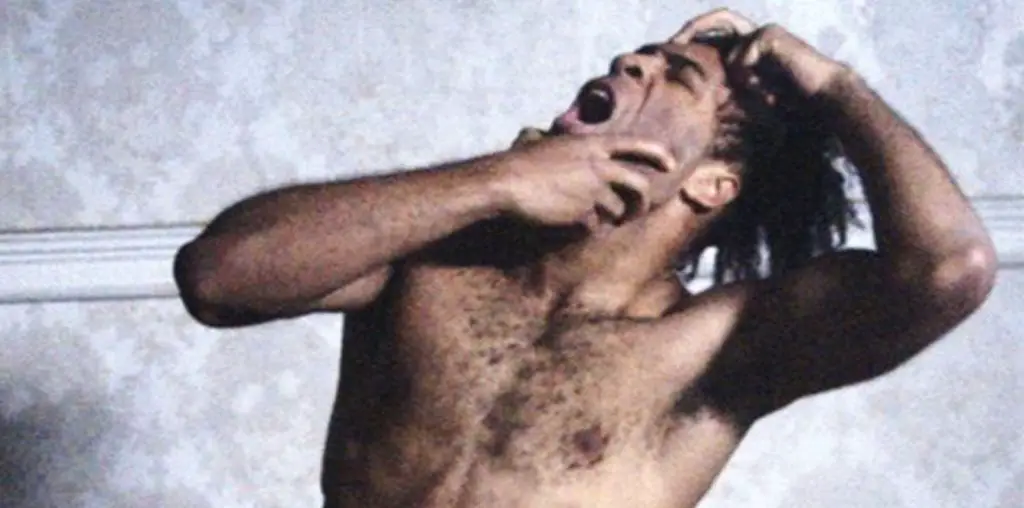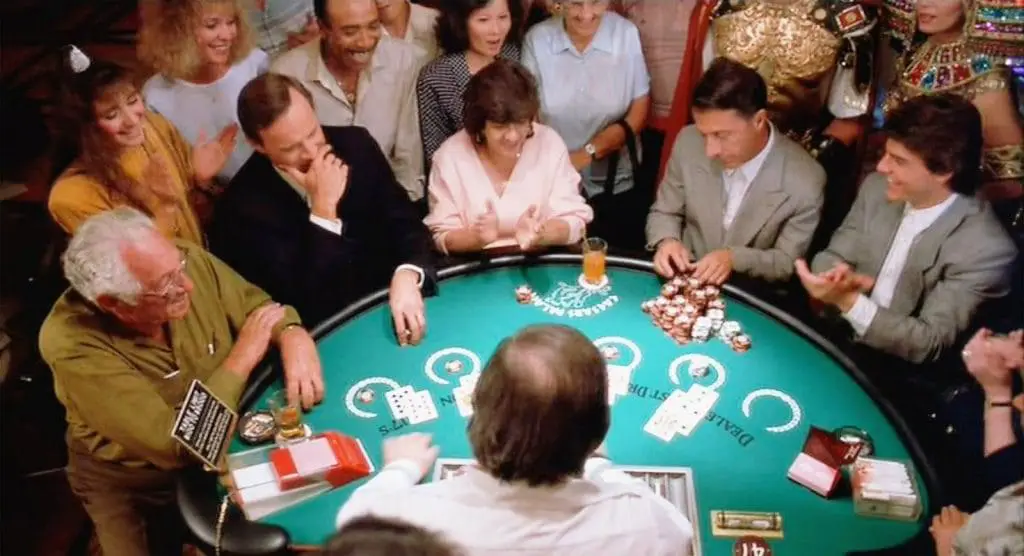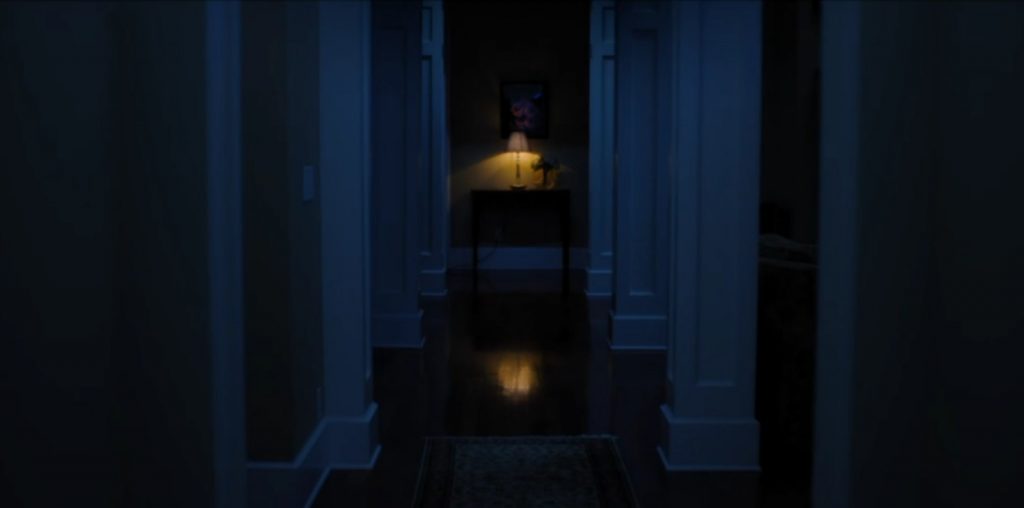
So, you’re one of “them,” are ya? You’ve jumped off the “Give me Indie films or give me death!” bandwagon and hitched a ride on the one crowing that “Indie films already are dead?” Well, just switch back now, buckaroo, because David and Nathan Zellner’s perversely hysterical Plastic Utopia may be just the antidote for the glut of Gen-X “Sit In A Room and Pontificate” movies currently choking off the independent scene. Best described by David, the directing half of this Austin, Texas-based team, as a “dark comedy about morality,” the film is certain to shatter the illusions of those idealistic twits who believe that Nice Guys finish first.
James Mirstein (David) is a Mime. But he’s a Mime with a whole imaginary box full of Issues, as evidenced by a routine which more closely resembles the blood-spurting Black Knight sequence in “Monty Python’s Search for the Holy Grail” than that of your typical Mime’s G-Rated game of Charades. Despite the fact that he sleeps in a bright, cheerful room packed with cute and cuddly stuffed animals, wakes up to an alarm clock encouraging him to “Carpe Diem!” and sips fruit juice from a Krazy Straw for breakfast, James is a miserable wreck.
“I wanted James to be a wuss, physically and mentally,” David says of his on-screen character. “He’s the epitome of a weenie.”
“Everybody hates Mimes,” producer brother Nathan adds with a wicked grin.
James’ ne-er do good roommate Frank Feldspar (Nathan), on the other hand, is a straight from the trailer park black sheep with a Lyle Lovett meets skinny Elvis haircut; the kind of guy who wolfs down whole waffles in a single bite and does push-ups with a lit cigarette dangling from his lips. A whiskey-swillin’, gun-totin’ gambler, hit man, and world-class poet – (“Molasses in my pants, Molasses in my pants. Oh, how I loves to sing and dance, when I gots molasses in my pants.”) – Frank is an irresistible chick magnet, as universally beloved by all as James is reviled.
The more James chafes under the repressive rules of the Mime’s Code, strictly enforced by an oppressive, Illuminati-like Temple of Mimes, the more he longs to be carefree and amoral, living life as a rebel and riding the razor’s edge. In other words, he wants to be like Frank. Hey, if you can’t beat ’em…
When James, being a lifelong virgin and all, stumbles into Sister Betsy (Tracy Simpson), a member of a Migrant Nun convent(!), he quickly develops a crush on her. Desperately trying to woo her into becoming his “Main Squeeze” while simultaneously trying to dodge Frank’s feral, insanely lovesick sister Ruth (Kerri Lause), James misguidedly boasts of his decision to join Frank in a life of crime. Alas, we are who we are and the harder poor James tries, the more the world dumps on him. Conversely, to the frustrated Mime’s utter consternation, the less effort Frank puts out, the better things turn out for him, until the charismatic rogue emerges as a potential new Messiah.
With David fresh from the University of Texas’ film program, the Zellner brothers eschewed the usual “move to LA and get a PA job” path to filmmaking. Instead, after producing a number of video shorts, they decided to launch right into their first feature film. After they touched up the Plastic Utopia script David had written at UT, they cashed in an unneeded insurance policy they’d received from their grandmother and combined that seed money with money from savings, a grant from the Richard Linklater-founded Texas Filmmakers Production Fund and, of course, credit cards to finance the film.
“We’ve been doing home movies for a long time,” Nathan shrugs, as if to downplay their extraordinarily ambitious leap. “And this is kind of like a big home movie!” David chimes in.
Hardly. Shot over the course of about a month – (“I’m kind of embarrassed, but I don’t remember the exact number of days. Around 25,” David admits sheepishly.) – with the help of “an enthusiastic and devoted crew,” this ambitious production proceeded despite a couple of unique potential pitfalls; not the least of which was having both the producers/writers and the director in front of the camera most of the time… without any video playback capabilities.
“We knew we were gonna act in it,” David relates. “So we wrote it around what we were capable of doing. We did tons of rehearsal.”
Still, “If we felt really good about a scene, then we had to ask some of the other crew members. But then, if you ask too many times, everybody starts giving their own opinions,” Nathan sighs with the tired air of a guy all-too-familiar with that particular scenario.
Then, too, was the paradox of having David direct while also playing a sniveling, whiny geek on camera. That juxtaposition, coupled with his and Nathan’s admittedly anal attention to on-camera detail led to a surprisingly business-like set for such an anarchic, raucous movie.
“Since we ended up doing (most of) the costume design and art direction (as well) I was constantly thinking. I didn’t joke around a whole lot. Plus my character doesn’t laugh through the whole movie,” David explains.
Plastic Utopia is an unrelentingly lurid romp through the darker side of comedy, full of such unapologetically disturbing sound bites as Frank fuming about his sister, “First of all, Ruth’s not rancid! She’s a fine piece of a*s!” and later, when Frank’s card-playing cohorts spot James with Sister Betsy, Frank simply grunts, “‘Bout time he got some p***y.”
The film is also teeming with an outrageous collection of non-sequitur sight gags. In “Plastic Utopia’s” universe, for example, Nathan doesn’t just drive a car, he drives a Dodge Omni with a ten-point buck lashed to the hood over a license plate that reads “Badass Honcho.” We never find out why. Frank and James don’t just stick up a convenience store with nylon masks. That would be boring. Instead, they rob the “Party Putt” miniature golf course wearing aluminum foil hoods. (Apparently it was the only location that would allow them to discharge firearms. “I think that place is closed now…” Nathan muses.) At one point early in the film, a distraught James threatens to kill himself…with a spear gun.
Although occasionally inspired by the locations’ inherent limitations, quirks like these help set “Plastic Utopia” in a garishly colorful time and place that’s as undefined as it is kaleidoscopically bizarre.
Perhaps most refreshing of all about this twisted gem is the fact that the film follows through on its evil destiny. Plastic Utopia refuses to yield to the politically correct temptation to slap on a happy ending and redeem James’ fate at Frank’s expense.
“That would’ve killed me!” David howls. “Frank’s character progressively is better off than James’ with less and less effort each time, to the point of where (Frank) becomes a Divine Being. You can’t beat that as far as popularity!
“I wanted (James) to be driven into the ground,” he continues. “I didn’t want him to win at all. It could be the ‘Underdog Triumphs’ type of story, but I didn’t want it to end like that. I wanted you to think that he had (won)… that he kinda triumphs for a split-second. Then he’s driven to the ground.”
Aah. Refreshing as a cool breeze.
Plastic Utopia has run the festival circuit following its wildly successful premiere last fall at the Austin Film Festival and the Zellner brothers, who can’t escape the obvious comparisons to the Brothers Coen and Zucker, is excited that the film is now out on video.
Perhaps this fiercely unique film can shake up the doldrums paralyzing the independent filmmaking scene. Then we could catch up with that first bandwagon again before it rolls completely out of sight.


